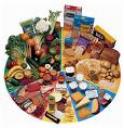 Poor nutrition in female athletes can cause tiredness, performance plateaus or decreases, burn-out, and repeated injuries. With the competitiveness in sports reaching unprecedented levels, athlete nutrition is an integral part of athletic performance; and diet can be the difference between winning and losing. Moreover, today’s athletic generation must be prepared to improve performance and maintain health to compete for college scholarships on a national level.
Poor nutrition in female athletes can cause tiredness, performance plateaus or decreases, burn-out, and repeated injuries. With the competitiveness in sports reaching unprecedented levels, athlete nutrition is an integral part of athletic performance; and diet can be the difference between winning and losing. Moreover, today’s athletic generation must be prepared to improve performance and maintain health to compete for college scholarships on a national level.
By following sound sports nutrition guidelines, it is reasonable that an athlete can find a whole new level of play. For example, a high school athlete can hold a competitive edge just by hydrating and fueling her body before and after athletic performance. As a result the player is more alert, less likely to become injured and at peak performance should a scout make an unannounced appearance.
It is especially important for females of all ages to follow good nutrition guidelines to counteract the impact that sports place on their body. Good nutrition:
- serves to maintain optimum bodily function or good health;
- provides the body with energy (fuel); and
- plays a critical role in the growth and repair of cells following training.
Because tissue is broken down during training, it must be fully replenished before the next session. The process is always the same: breakdown, recovery, growth. The body must fully recover from training before the re-growth can commence. If it doesn’t, and the athlete trains again while still in a catabolic (breakdown) state, then sooner or later the athlete will end up over-training, and if this carries on, will go into reverse, losing physical strength and capability.
The essential nutrients that female athletes need are protein, carbohydrates, fat, vitamins and minerals. Proteins include fish, chicken, meat, eggs, milk and cheese. Examples of carbohydrates, which are the body’s main fuel source, are wholewheat products, oats, potatoes, rice and pasta. Fat intake should ideally be 50% unsaturated. Olive oil, flax seed oil and similar products are representative of the best form of fat.
The ideal diet for female athletes is:
- about 70% carbohydrates,
- 20%-30% fat, and
- 10%-15% protein.
Total caloric intake shoude be 1500-300 kcal/day depending on intensity, frequency and duration of activity.
If a female athlete begins to complain of fatigue, irritability or reduced endurance, they may be suffering from an iron deficiency. In addition to having their iron checked by a blood test, they can keep their stores up (about 18 mg each day) by eating iron-rich foods such as meat, poultry and fish. Dietary iron supplements should only be taken under medical supervision.
In addition to adequate iron, female athletes need sufficient calcium for bone development and strength. About 1300 mg per day is needed for female athletes, age 11-24, and is best obtained through diet. Some calcium sources include skim milk, swiss cheese, yogurt, broccoli, calcium fortified orange juice and cottage cheese. Calcium supplements should not be taken without medical supervision.
In sum, female athletes need to follow a healthy diet with an adequate intake of calories, iron and calcium to maintain and improve performance. Athletes who consume adequate calories and nutrients feel better, train harder, recover more quickly and are less susceptible to injury and illness.
Listed below are links to weblogs that reference What’s a healthy weight for you? :
Coronary artery disease and type 2 diabetes are usually associated with excess weight (obesity).So, you can buy proactol and become attractive slim person.
By losing excess weight,you will be live a long and happier life, healthier, feel more energetic.